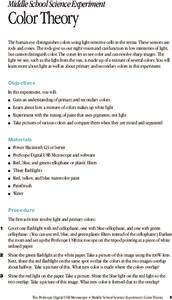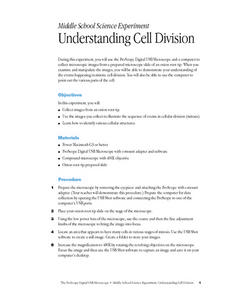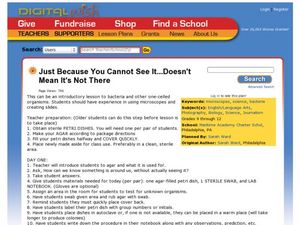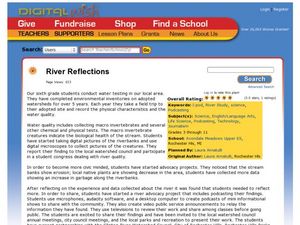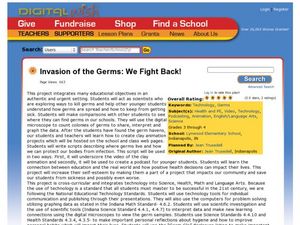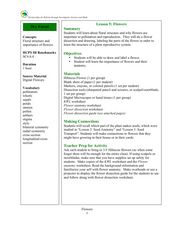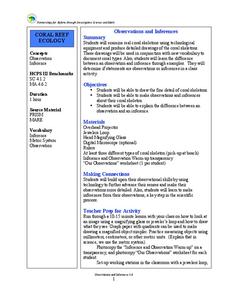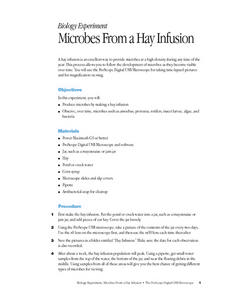Curated OER
Mystery Powders
Students collect microscopic images from a variety of chemical specimens to determine the identity of a mystery powder. They use a ProScope Digital USB Microscope to describe and compare the crystal size and shape of the chemicals.
Curated OER
Color Theory
Students are able to gain an understanding of primary and secondary colors. They are able to explore about how a mixture of colors makes up white light. Students are able to experiment with the mixing of paint that uses pigments, not...
Curated OER
Understanding Cell Division
Pupils collect and describe cells from an onion root tip which are undergoing the stages of cell division. They use a ProScope USB microscope to identify and compare cells in five phases of mitosis.
Curated OER
Just Because You Cannot See It... Doesn't Mean It's Not There
Students discover bacteria which is around them by using agar over three days. In this biology lesson, students predict what they will see over the three days and then take photographs of what is actually shown. Finally, students write...
Curated OER
Frogs
Students explore the external and internal structures of an amphibian and how frog anatomy compares to human anatomy. They collect pictures of a frog using a digital camera, create a web page, develop a PowerPoint presentation, and...
Curated OER
Magnificent Magnification!
Young scholars magnify their digital artwork to develop their motor skills with a mouse. Using the artwork, they discover how to look at it from different perspectives. They answer discussion questions as they complete the activity.
Curated OER
It's Fun to Learn!
Students use the macro mode of the OLYMPUS FE-140 CAMERAS as virtual microscopes to explore different habitats, observe plants, soil, and insects and other creatures. They download those images on electronic files and build web pages....
University of Hawaiʻi
Taxonomy and Me!
Taxonomy is the study of organisms and how you phylum. Three biology activities are included, helping scholars understand four of the six kingdoms, specifically Protista, Plantae, Fungi, and Animalia. Scholars observe and classify in...
Nuffield Foundation
Dissecting Lungs
Here is a lab activity where teens experience the respiratory system first-hand as they dissect lungs and identify key structures within the system. Although the website is written in British English with some slightly different verbiage...
Curated OER
My Favorite Biology Supplies
Here are some biology laboratory supplies that I can't live without.
Curated OER
What is Sand?
Students complete a sand analysis project. In this sand grains lesson, students learn background information on how sand is formed and what sand grains are made of. Students are given bags of sand and use them to complete a worksheet...
Curated OER
Plant and Animal Cells
Students investigate parts of a cell. In this plant cell lesson plan, students determine the difference between plant and animal cells. Students discover that coral is an animal based on cell characteristics. Students create puppets to...
Curated OER
Seed Types
Students dissect seeds. In this seed dissection lesson, students discover the anatomy of seeds. After dissecting seeds, students hypothesize and design the perfect seed to survive in a dry forest.
Curated OER
What Is in the Water?
Students compare bottled water qualities to water found naturally in a pond habitat. They research their state's laws/regulations in regard to bottled water and study the advertising, cost, and quality of brands of bottled water. They...
Curated OER
Chemical Changes Making Foam and Using Indicators
Students are able to observe chemcial and physical changes while producing a brilliant formation of foam. They are able to experience the use of an indicator in the reaction. Students record information based on their observations.
Curated OER
Solving Mysteries Using Paper Chromotagraphy
Students solve the mystery of the kidnapped teacher by analyzing a ransom note using paper chromatography. They carefully prepare ink samples from the note to known ink samples to determine the kidnapper.
Merck KGaA (Darmstadt, Germany)
EMD PTE
You can't tell by the title, but this is a functional periodic table of elements. Incorporating bright colors, lucid text, and easily operated features, this application serves as a valuable reference tool for your chemistry class.
Curated OER
Critters in the Classroom
Students investigate with sea urchins. In this ocean habitat lesson, students observe sea urchins and other ocean grazers. Students work with lab equipment to examine the anatomy of these creatures.
Curated OER
River Reflections
Sixth graders create podcasts and video public service announcements. In this environmental advocacy lesson, 6th graders study the local watershed and become advocates for their local environment. In the process, they create podcasts and...
Curated OER
Invasion of the Germs: We Fight Back!
Students fight off germs. In this technology skills lesson, students create claymation videos with accompanying podcasts that educate others about the H1N1 virus and methods to fight germs.
Curated OER
Dry Forest: Flowers
Students explore botany by examining diagrams. In this plant reproduction lesson, students define a list of plant vocabulary terms and identify plant anatomy from a diagram. Students complete several plant activity worksheets and study...
Curated OER
An Introduction to 'Opae 'ula
Students examine the 'opae 'ula. In this science lesson, students observe a live specimen and identify the major body parts. Students construct habitat jars and observe the 'opae 'ula behaviors.
Curated OER
Observations and Inferences
Students examine coral skeletons. In this science lesson, view real coral skeletons. Students explain the differences between an observation and an inference. Students draw a coral skeleton.
Curated OER
Microbes From a Hay Infusion
Students observe, over time, microbes such as amoebas, protozoa, rotifers and insect larva. They create a hay infusion culture using pond water then sample and record organisms found over a two week period.
Other popular searches
- Using Digital Microscope
- Digital Microscope Hair
- Digital Microscope Insects
- Digital Microscope Sugar
- Digital Microscope Food Web



